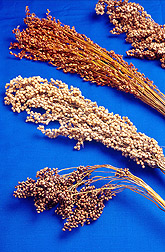This page has been archived and is being provided for reference purposes only. The page is no longer being updated, and therefore, links on the page may be invalid.
|
Read the magazine story to find out more. |
|
|
|
|
Secrets to Sorghum Survival in Acidic Soils
By Ann PerryNovember 21, 2008
A gene that protects sorghum from aluminum in acidic soils has been identified by an Agricultural Research Service (ARS) scientist and cooperators.
Acidic soils, which are found around the world, often have aluminum levels that are toxic to food plants such as sorghum. This finding could help plant breeders develop sorghum varieties that can be grown by subsistence farmers who depend on this grain crop for survival.
Plant physiologist Leon Kochian leads the ARS Robert W. Holley Center for Agriculture and Health in Ithaca, N.Y. For this research, he collaborated with Jurandir V. Magalhaes, a scientist with Embrapa Maize and Sorghum, a branch of the Brazilian Agricultural Research Corporation (EMBRAPA), Brazil’s federal agricultural research agency.
Aluminum tolerance in wheat is regulated by the aluminum-tolerance gene ALTM1. When ALTM1 is activated, it triggers the release of malic acid, which bonds with the aluminum and neutralizes its toxic effect.
The research team found a gene in sorghum that protects the plant from soil aluminum via mechanisms that closely parallel ALTM1’s activity in wheat. In sorghum, the aluminum tolerance gene prompts the release of citric acid, which also binds to soil aluminum. But this sorghum transporter—dubbed SbMATEis not related to the ALMT1 transporter protein.
The team found that activity of SbMATE is activated in the roots of aluminum-tolerant sorghum only when aluminum is present in the soil. Under these conditions, SbMATE is most highly expressed in the first centimeter of the tip of the root. This optimizes the ability of the transporter to neutralize the aluminum and protect the sensitive root tip.
ARS and EMBRAPA researchers are now engaged in collaborative projects with plant breeders in Africa to develop aluminum-tolerant sorghum varieties for cultivation in African soils.
Read more about this research in the November/December 2008 issue of Agricultural Research magazine.
ARS is a scientific research agency in the U.S. Department of Agriculture.

